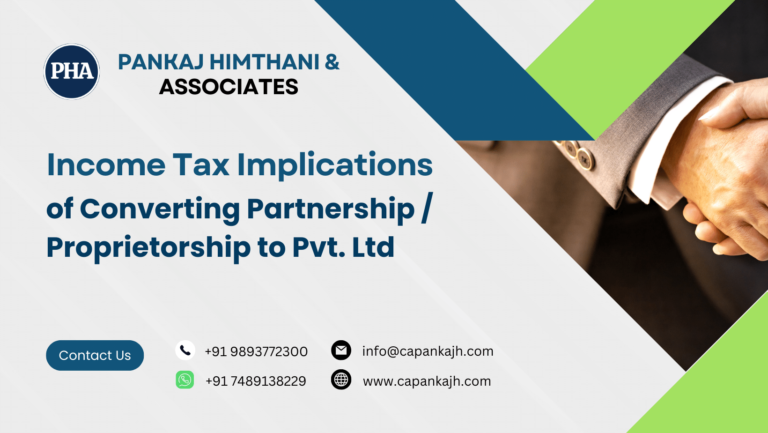Tax Transitions: Exploring the Impact of Converting to Pvt. Ltd. from Partnership / Proprietorship

Overview of Conversion:
Converting from a partnership or proprietorship to a Pvt. Ltd company involves a change in the legal structure of the business entity. This transformation affects various aspects, including ownership, management, compliance requirements, and taxation. While the conversion offers advantages like limited liability protection and easier access to capital, it also triggers specific income tax implications that business owners need to consider carefully.
Converting a partnership or proprietorship business to a private limited company entails various income tax implications that business owners should consider. Here’s an overview of the key tax implications associated with this conversion:
1. Capital Gains Tax
- Upon conversion, assets and liabilities of the partnership or proprietorship business are transferred to the newly formed private limited company. Any capital gains arising from the transfer of capital assets, such as land, building, machinery, etc., may attract capital gains tax liability.
2. Tax on Accumulated Profits
- In the case of a partnership firm or proprietorship, accumulated profits are taxed in the hands of partners or the proprietor as per their respective income tax slabs. However, upon conversion to a private limited company, accumulated profits may be subject to tax under the provisions of the Income Tax Act, such as deemed dividend tax or distribution tax.
3. Taxation of Business Income
- The mode of taxation for business income may change after conversion to a private limited company. While partnership firms and proprietorships are taxed at the individual or partnership level, private limited companies are subject to corporate tax rates on their business income.
4. Minimum Alternate Tax (MAT)
- Private limited companies are liable to pay Minimum Alternate Tax (MAT) if their tax liability, computed as per the normal provisions of the Income Tax Act, is lower than the prescribed MAT rate. MAT provisions may apply to the converted private limited company, depending on its profitability and tax liability.
5. Tax Deductions and Exemptions
- Private limited companies may avail of various tax deductions and exemptions available under the Income Tax Act, such as deductions for business expenses, depreciation on assets, research and development expenses, etc. These deductions and exemptions may differ from those available to partnership firms or proprietorships.
6. Compliance Requirements
- Private limited companies are subject to specific compliance requirements under the Companies Act, such as maintenance of books of accounts, statutory audits, filing of annual returns, and compliance with corporate governance norms. Failure to comply with these requirements may attract penalties or adverse tax consequences.
7. Dividend Distribution Tax (DDT)
- If the private limited company distributes dividends to its shareholders, it may be liable to pay Dividend Distribution Tax (DDT) at the applicable rates. Dividends received by shareholders may also be subject to tax in their hands, depending on their individual tax liabilities.
8. Tax Planning Opportunities
- Conversion to a private limited company may offer tax planning opportunities, such as restructuring of shareholding patterns, optimizing tax-efficient remuneration structures, utilizing tax credits, and accessing incentives available to corporate entities.
Business owners considering the conversion of their partnership or proprietorship business to a private limited company should consult with tax advisors or chartered accountants to assess the specific tax implications, plan the conversion process effectively, and ensure compliance with applicable tax laws and regulations.

